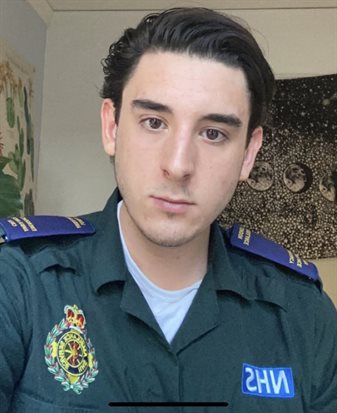Paramedic Science graduate on volunteering on the front line.
Published: 05 July 2021
Class of 2020 Paramedic Science alumnus, James Hibbert, volunteered as Emergency Ambulance Crew for the London Ambulance Service last year and now works as a paramedic in General Practice.

Speaking about his experiences of the last year since completing his course at St George’s, James says:
“My role involves seeing patients as they present to Primary Care, assessing their condition and formulating a treatment plan or referring where necessary to Secondary Care. I feed back to other clinicians if a patient has an ongoing complaint and we formulate a treatment plan together.
“It has been very rewarding to be able to perform home visits. These visits help provide better accessibility to healthcare for patients with reduced mobility or those who are housebound. "
I often get to check back in on my patients to see how they are getting on and it’s great to see the difference the treatment plan has made to them.
Discussing the impact of the Covid-19 pandemic, James notes that many consultations had to take place by telephone or virtually. That made forming a clinical picture more challenging, so some patients had to be invited into the clinic directly for a face-to-face appointment.
Reflecting on how his role as a volunteer for London Ambulance Service helped prepare him for his current role, James says:
I really enjoyed getting to play an active role in helping on the front line while completing my degree.
"The role has allowed me to learn things about my chosen career and gain the sort of experience you normally would not have the opportunity to get as a student.
“As Emergency Ambulance Crew you could be out on the road with a paramedic or grouped with a fellow Emergency Ambulance Crew member, so it was important to be able to work independently and use your initiative.”
He adds: “My experience as a volunteer has helped me immensely in my current role. Many patients who use the ambulance service don’t require immediate emergency treatment in hospital, so referring these patients to their most appropriate pathway was very relevant to my current role.”
Looking back on his time at St George’s, James says:
My degree provided me with the practical skills to assess patients and formulate management plans that help to improve the quality of life for many patients.
"This has really helped give me confidence to build upon the skills needed in my practice.”